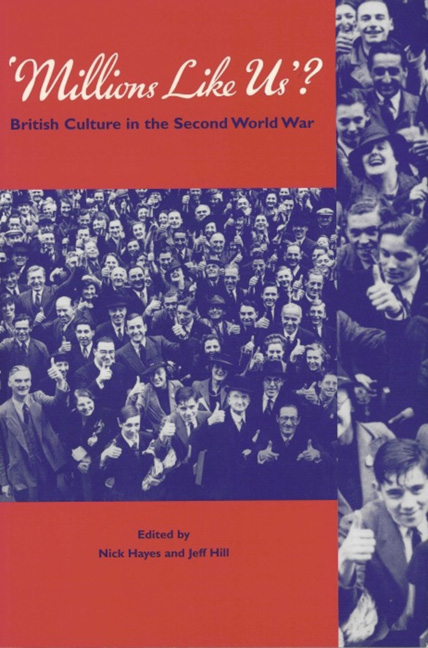Book contents
- Frontmatter
- Contents
- List of Figures and Tables
- Notes on Contributors
- Acknowledgements
- An ‘English War’, Wartime Culture and ‘Millions Like Us’
- British Cinema and ‘The People's War’
- The People's Radio: The BBC and its Audience, 1939–1945
- Was it the Mirror Wot Won it? The Development of the Tabloid Press During the Second World War
- A More Even Playing Field? Sport During and After the War
- A Time for Hard Writers: The Impact of War on Women Writers
- Safe and Sound: New Music in Wartime Britain
- More Than ‘Music-While-You-Eat’? Factory and Hostel Concerts, ‘Good Culture’ and the Workers
- ‘When Work Is Over’: Labour, Leisure and Culture in Wartime Britain
- Not Just a Case of Baths, Canteens and Rehabilitation Centres: The Second World War and the Recreational Provision of the Miners’ Welfare Commission in Coalmining Communities
- ‘You and I – All of Us Ordinary People’: Renegotiating ‘Britishness’ in Wartime
- Postscript: A War Imagined
- Index
Safe and Sound: New Music in Wartime Britain
- Frontmatter
- Contents
- List of Figures and Tables
- Notes on Contributors
- Acknowledgements
- An ‘English War’, Wartime Culture and ‘Millions Like Us’
- British Cinema and ‘The People's War’
- The People's Radio: The BBC and its Audience, 1939–1945
- Was it the Mirror Wot Won it? The Development of the Tabloid Press During the Second World War
- A More Even Playing Field? Sport During and After the War
- A Time for Hard Writers: The Impact of War on Women Writers
- Safe and Sound: New Music in Wartime Britain
- More Than ‘Music-While-You-Eat’? Factory and Hostel Concerts, ‘Good Culture’ and the Workers
- ‘When Work Is Over’: Labour, Leisure and Culture in Wartime Britain
- Not Just a Case of Baths, Canteens and Rehabilitation Centres: The Second World War and the Recreational Provision of the Miners’ Welfare Commission in Coalmining Communities
- ‘You and I – All of Us Ordinary People’: Renegotiating ‘Britishness’ in Wartime
- Postscript: A War Imagined
- Index
Summary
Of all images of the composer in wartime, none is better known or more compelling than that of the half-starved Dmitri Shostakovich sitting in his unheated room in Leningrad writing his Seventh Symphony, while the Germans pounded the besieged city. An image of Ralph Vaughan Williams, at that very time completing his Fifth Symphony in the relative peace and comfort of his Dorking home, somehow does not have the same heroic drama. And yet there is an underlying similarity in the situation of the two men. Neither could ignore the war; this was total war, after all. Nor did they want to ignore it: as creative artists both willingly placed their art at the service of the nation at war.
Like Shostakovich, Vaughan Williams was the leading musical figure of his country. Some years before, he had delivered a down-to-earth message to his fellow-composers: ‘The composer must not shut himself up and think about art; he must live with his fellows and make his art the expression of the whole life of the community.’ And, more famously: ‘The art of music above all the other arts is the expression of the soul of the nation.’ The implications for composers when war came to command the ‘whole life’ and perhaps even ‘the soul’ of the British people were clear, not least to Vaughan Williams himself. For most composers in the period 1939–45, at least, those who chose to remain composers, it meant accepting commissions from official or quasi-official sources to write music that would help sustain the war effort; thus did total war mobilize and channel the nation's ‘creative resources’. Most commonly, the work entailed writing music for documentary and feature films, but there were commissions, too, to write for radio features and to produce works for ceremonial or martial occasions and concerts for the forces and war-workers. Some composers, of course, were of an age that made them liable for military service; for these, whether called up or conditionally exempted, composition was to a degree bound by the same official needs and preferences.
The war was more than an organizer of people's lives, however. It was also a disturber of feelings.
- Type
- Chapter
- Information
- Millions Like Us?British Culture in the Second World War, pp. 179 - 208Publisher: Liverpool University PressPrint publication year: 1999

